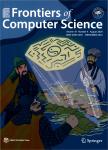Exploit latent Dirichlet allocation for collaborative filtering
Exploit latent Dirichlet allocation for collaborative filtering作者机构:State Key Laboratory of Software Development Environment Beihang University Beijing 100191 China School of Information Beijing Wuzi University Beijing 101149 China College of Computer Science and Technology Nanjing University of Aeronautics and Astronautics Nanjing 211106 China Collaborative Innovation Center of Novel Software Technology and Industrialization Nanjing 211106 China Beijing Advanced Innovation Center for Imaging Technology Capital Normal University Beijing 100048 China
出 版 物:《Frontiers of Computer Science》 (中国计算机科学前沿(英文版))
年 卷 期:2018年第12卷第3期
页 面:571-581页
核心收录:
学科分类:0711[理学-系统科学] 0810[工学-信息与通信工程] 0808[工学-电气工程] 07[理学] 070104[理学-应用数学] 0701[理学-数学] 0812[工学-计算机科学与技术(可授工学、理学学位)]
基 金:We greatly appreciate Weike Pan for his codes of algorithm GBPR which makes us able to evaluate the algorithm more efficiently and more fairly. This work was supported by the National Natural Science Foundation of China (NSFC) (Grant Nos. 61370126 61672081 71540028 61571052 61602237) National High-tech R&D Program of China (2015AA016004) Beijing Advanced Innovation Center for Imaging Technology (BAICIT-2016001) the Fund of the State Key Laboratory of Software Development Environment (SKLSDE-2013ZX-19) the Fund of Beijing Social Science (14JGC103) the Statistics Research Project of National Bureau (2013LY055) and the Fund of Beijing Wuzi University China (GJB20141002).
主 题:latent Dirichlet allocation one-class collaborative filtering multi-class collaborative filtering
摘 要:Previous work on the one-class collaborative filtering (OCCF) problem can be roughly categorized into pointwise methods, pairwise methods, and content-based methods. A fundamental assumption of these approaches is that all missing values in the user-item rating matrix are considered negative. However, this assumption may not hold because the missing values may contain negative and positive examples. For example, a user who fails to give positive feedback about an item may not necessarily dislike it; he may simply be unfamiliar with it. Meanwhile, content-based methods, e.g. collaborative topic regression (CTR), usually require textual content information of the items, and thus their applicability is largely limited when the text information is not available. In this paper, we propose to apply the latent Dirichlet allocation (LDA) model on OCCF to address the above-mentioned problems. The basic idea of this approach is that items are regarded as words, users are considered as documents, and the user-item feedback matrix constitutes the corpus. Our model drops the strong assumption that missing values are all negative and only utilizes the observed data to predict a user's interest. Additionally, the proposed model does not need content information of the items. Experimental results indicate that the proposed method outperforms previous methods on various ranking-oriented evaluation metrics.We further combine this method with a matrix factorizationbased method to tackle the multi-class collaborative filtering (MCCF) problem, which also achieves better performance on predicting user ratings.



